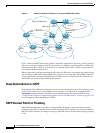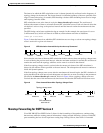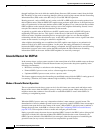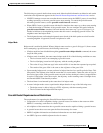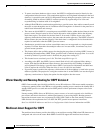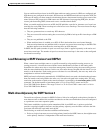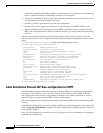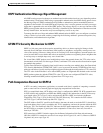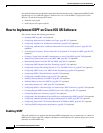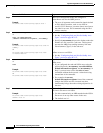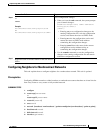
Implementing OSPF on Cisco IOS XR Software
How to Implement OSPF on Cisco IOS XR Software
RC-194
Cisco IOS XR Routing Configuration Guide
OL-14356-01
For detailed information for the Path Computation Element feature see the “Implementing MPLS Traffic
Engineering on Cisco IOS XR software” module of the Cisco IOS XR MPLS Configuration Guide,
Release 3.6, and the following IETF drafts:
• draft-ietf-ospf-cap-09
• draft-ietf-pce-disco-proto-ospf-00
How to Implement OSPF on Cisco IOS XR Software
This section contains the following procedures:
• Enabling OSPF, page RC-194 (required)
• Configuring Stub and Not-So-Stubby Area Types, page RC-197 (optional)
• Configuring Neighbors for Nonbroadcast Networks, page RC-199 (optional)
• Configuring Authentication at Different Hierarchical Levels for OSPF Version 2, page RC-204
(optional)
• Controlling the Frequency That the Same LSA Is Originated or Accepted for OSPF, page RC-207
(optional)
• Creating a Virtual Link with MD5 Authentication to Area 0 for OSPF, page RC-209 (optional)
• Summarizing Subnetwork LSAs on an OSPF ABR, page RC-213 (optional)
• Redistributing Routes from One IGP into OSPF, page RC-215 (optional)
• Configuring OSPF Shortest Path First Throttling, page RC-219 (optional)
• Configuring Nonstop Forwarding Specific to Cisco for OSPF Version 2, page RC-224 (optional)
• Configuring OSPF Version 2 for MPLS Traffic Engineering, page RC-226 (optional)
• Configuring OSPFv3 Graceful Restart, page RC-230 (optional)
• Configuring an OSPFv2 Sham Link, page RC-233 (optional)
• Enabling Nonstop Routing for OSPFv2, page RC-236 (optional)
• Enabling Multicast-intact for OSPFv2, page RC-237 (optional)
• Associating Interfaces to a VRF, page RC-238 (optional)
• Configuring OSPF as a Provider Edge to Customer Edge (PE-CE) Protocol, page RC-240 (optional)
• Creating Multiple OSPF Instances (OSPF Process and a VRF), page RC-243 (optional)
• Configuring Multi-area Adjacency, page RC-244 (optional)
• Configuring Label Distribution Protocol IGP Auto-configuration for OSPF, page RC-246 (optional)
• Configuring Authentication Message Digest Management for OSPF, page RC-247 (optional)
• Configuring Generalized TTL Security Mechanism (GTSM) for OSPF, page RC-251 (optional)
• Verifying OSPF Configuration and Operation, page RC-254 (optional)
Enabling OSPF
This task explains how to perform the minimum OSPF configuration on your router that is to enable an
OSPF process with a router ID, configure a backbone or nonbackbone area, and then assign one or more
interfaces on which OSPF runs.



